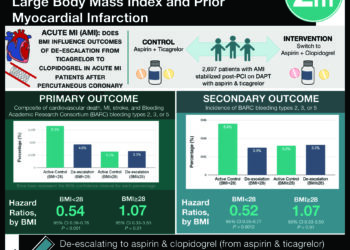Patient diet choices not associated with improved weight loss
1. From this randomized trial, the opportunity to choose a diet plan did not improve weight loss.
2. Choice in diet program did not improve dietary adherence or weight-related quality of life.
Evidence Rating Level: 1 (Excellent)
Study Rundown: Adherence to diet plans has been shown as the best predictor of weight loss. To facilitate this, it has been suggested that patients be allowed to decide between plans based on preference. This study evaluated whether overweight participants who were allowed to choose between 2 diet plans had better weight loss outcomes than if those assigned at random. Participants in the choice group selected from a low-carbohydrate diet or a low-fat diet based on personal food preferences and values, while the comparator group was randomly assigned. Average estimated weight loss at 48 weeks did not differ significantly between the choice group (average estimated weight loss of 5.7 kg) and the randomized group (average estimated weight loss of 6.7 kg). No difference was found for dietary adherence or quality of life. Limitations to this study include the use of only 2 diet choices, enrollment of primarily men, and the measurement of adherence through self-report questionnaires. However, this study used preference counseling for diet selection that aligns well with an outpatient setting, and overall shows that patient-directed diet choice likely has little effect on weight loss.
Click to read the study, published today in The Annals of Internal Medicine
Relevant Reading: Weight Loss with a Low-Carbohydrate, Mediterranean, or Low-Fat Diet
In-Depth [randomized controlled trial]: 207 participants were recruited from VA outpatient clinics and randomly assigned to a choice group (n= 105) or comparator group (n= 102). 61 (58%) of choice group participants selected the low-carbohydrate diet and 44 (42%) the low-fat diet. 53 (52%) of the comparator group were randomized to the low-carbohydrate diet and 49 (48%) to the low-fat diet. In the choice group, 71% selected diets aligning with their reported food preferences, and patients were followed for 48 weeks. Dietary adherence was measured with the Block Brief 2000 Food Frequency Questionnaire, and weight-related quality of life measured with the Impact of Weight on Quality of Life-Lite questionnaire. At 48 weeks, estimated mean weight loss was 5.7 kg (95% CI, 4.3-7.0 kg) in the choice group and 6.7 kg (95% CI, 5.4-8.0 kg) in the comparator group, for a difference of -1.1 kg (95% CI, -2.9-0.8; P= 0.26). Dietary adherence was similar between groups (P=0.66), and no difference was noted in quality of life scores (P=0.65)
Image: PD
©2015 2 Minute Medicine, Inc. All rights reserved. No works may be reproduced without expressed written consent from 2 Minute Medicine, Inc. Inquire about licensing here. No article should be construed as medical advice and is not intended as such by the authors or by 2 Minute Medicine, Inc.







